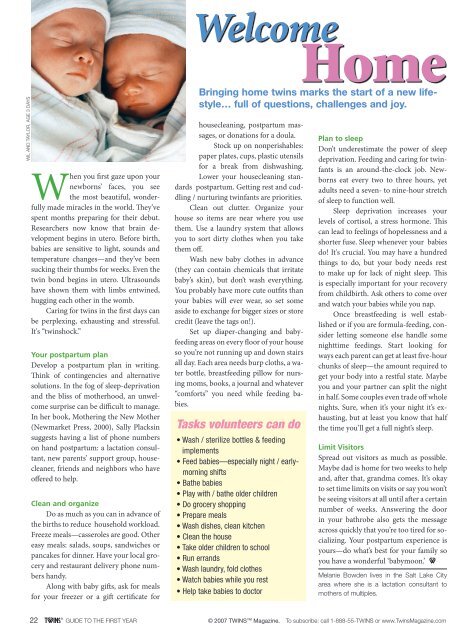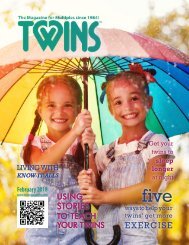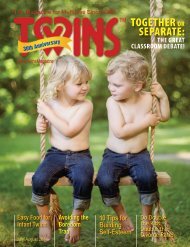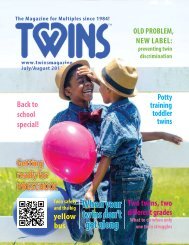2007GuideToTheFirstYear
Create successful ePaper yourself
Turn your PDF publications into a flip-book with our unique Google optimized e-Paper software.
WIL AND TAYLOR, AGE 3 DAYS<br />
When you first gaze upon your<br />
newborns’ faces, you see<br />
the most beautiful, wonderfully<br />
made miracles in the world. They’ve<br />
spent months preparing for their debut.<br />
Researchers now know that brain development<br />
begins in utero. Before birth,<br />
babies are sensitive to light, sounds and<br />
temperature changes—and they’ve been<br />
sucking their thumbs for weeks. Even the<br />
twin bond begins in utero. Ultrasounds<br />
have shown them with limbs entwined,<br />
hugging each other in the womb.<br />
Caring for twins in the first days can<br />
be perplexing, exhausting and stressful.<br />
It's “twinshock.”<br />
Your postpartum plan<br />
Develop a postpartum plan in writing.<br />
Think of contingencies and alternative<br />
solutions. In the fog of sleep-deprivation<br />
and the bliss of motherhood, an unwelcome<br />
surprise can be difficult to manage.<br />
In her book, Mothering the New Mother<br />
(Newmarket Press, 2000), Sally Placksin<br />
suggests having a list of phone numbers<br />
on hand postpartum: a lactation consultant,<br />
new parents’ support group, housecleaner,<br />
friends and neighbors who have<br />
offered to help.<br />
Clean and organize<br />
Do as much as you can in advance of<br />
the births to reduce household workload.<br />
Freeze meals—casseroles are good. Other<br />
easy meals: salads, soups, sandwiches or<br />
pancakes for dinner. Have your local grocery<br />
and restaurant delivery phone numbers<br />
handy.<br />
Along with baby gifts, ask for meals<br />
for your freezer or a gift certificate for<br />
Welcome<br />
Home<br />
Bringing home twins marks the start of a new lifestyle…<br />
full of questions, challenges and joy.<br />
housecleaning, postpartum massages,<br />
or donations for a doula.<br />
Stock up on nonperishables:<br />
paper plates, cups, plastic utensils<br />
for a break from dishwashing.<br />
Lower your housecleaning standards<br />
postpartum. Getting rest and cuddling<br />
/ nurturing twinfants are priorities.<br />
Clean out clutter. Organize your<br />
house so items are near where you use<br />
them. Use a laundry system that allows<br />
you to sort dirty clothes when you take<br />
them off.<br />
Wash new baby clothes in advance<br />
(they can contain chemicals that irritate<br />
baby’s skin), but don’t wash everything.<br />
You probably have more cute outfits than<br />
your babies will ever wear, so set some<br />
aside to exchange for bigger sizes or store<br />
credit (leave the tags on!).<br />
Set up diaper-changing and babyfeeding<br />
areas on every floor of your house<br />
so you’re not running up and down stairs<br />
all day. Each area needs burp cloths, a water<br />
bottle, breastfeeding pillow for nursing<br />
moms, books, a journal and whatever<br />
“comforts” you need while feeding babies.<br />
Tasks volunteers can do<br />
• Wash / sterilize bottles & feeding<br />
implements<br />
• Feed babies—especially night / earlymorning<br />
shifts<br />
• Bathe babies<br />
• Play with / bathe older children<br />
• Do grocery shopping<br />
• Prepare meals<br />
• Wash dishes, clean kitchen<br />
• Clean the house<br />
• Take older children to school<br />
• Run errands<br />
• Wash laundry, fold clothes<br />
• Watch babies while you rest<br />
• Help take babies to doctor<br />
Plan to sleep<br />
Don’t underestimate the power of sleep<br />
deprivation. Feeding and caring for twinfants<br />
is an around-the-clock job. Newborns<br />
eat every two to three hours, yet<br />
adults need a seven- to nine-hour stretch<br />
of sleep to function well.<br />
Sleep deprivation increases your<br />
levels of cortisol, a stress hormone. This<br />
can lead to feelings of hopelessness and a<br />
shorter fuse. Sleep whenever your babies<br />
do! It's crucial. You may have a hundred<br />
things to do, but your body needs rest<br />
to make up for lack of night sleep. This<br />
is especially important for your recovery<br />
from childbirth. Ask others to come over<br />
and watch your babies while you nap.<br />
Once breastfeeding is well established<br />
or if you are formula-feeding, consider<br />
letting someone else handle some<br />
nighttime feedings. Start looking for<br />
ways each parent can get at least five-hour<br />
chunks of sleep—the amount required to<br />
get your body into a restful state. Maybe<br />
you and your partner can split the night<br />
in half. Some couples even trade off whole<br />
nights. Sure, when it’s your night it’s exhausting,<br />
but at least you know that half<br />
the time you’ll get a full night’s sleep.<br />
Limit Visitors<br />
Spread out visitors as much as possible.<br />
Maybe dad is home for two weeks to help<br />
and, after that, grandma comes. It’s okay<br />
to set time limits on visits or say you won’t<br />
be seeing visitors at all until after a certain<br />
number of weeks. Answering the door<br />
in your bathrobe also gets the message<br />
across quickly that you’re too tired for socializing.<br />
Your postpartum experience is<br />
yours—do what’s best for your family so<br />
you have a wonderful ‘babymoon.’<br />
Melanie Bowden lives in the Salt Lake City<br />
area where she is a lactation consultant to<br />
mothers of multiples.<br />
22 GUIDE TO THE FIRST YEAR © 2007 TWINS Magazine. To subscribe: call 1-888-55-TWINS or www.TwinsMagazine.com


















